|
|
|
Sort Order |
|
|
|
Items / Page
|
|
|
|
|
|
|
| Srl | Item |
| 1 |
ID:
116568
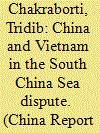

|
|
|
|
|
| Publication |
2012.
|
| Summary/Abstract |
The South China Sea dispute which has spilled over from the twentieth to the twenty-first century, is yet to find an amicable solution. The root cause of this tension is the dispute among the various claimants as regards the procurement of energy resources and securing territorial legitimacy. The entry of the US into the picture has further complicated the problem. In order to evolve a congenial regional environment, the disputing countries must evolve a collaborative outlook, not confrontationist, and adopt a regional perspective rather than proceed from their national interest only and take recourse to multilateral mechanisms as a means to reduce tension in the region. If the prognosis that the '21st century is the century of Asia' is to be made a reality, then the economic prosperity and development of the Asian region will be essential, for which, all the disputing countries should change their mindset from local to global level and keep the South China Sea region as less tension-prone as possible.
|
|
|
|
|
|
|
|
|
|
|
|
|
|
|
|
| 2 |
ID:
158249
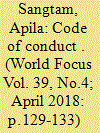

|
|
|
|
|
| Summary/Abstract |
According to China, their greatest hope is the peace and stability in the South China Sea. If countries want to build a sea of peace, stability, and prosperity, then a code of conduct is a must which has to be a legally binding including strong mechanism with geographical scope which is abided by all to maintain a regional security interest.
|
|
|
|
|
|
|
|
|
|
|
|
|
|
|
|
| 3 |
ID:
115364
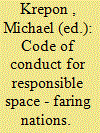

|
|
|
|
|
| Publication |
Washington DC, Stimson Center, 2010.
|
| Description |
81p.
|
|
|
|
|
|
|
|
|
|
|
|
Copies: C:1/I:0,R:0,Q:0
Circulation
| Accession# | Call# | Current Location | Status | Policy | Location |
| 056813 | 629.1/KRE 056813 | Main | On Shelf | General | |
|
|
|
|
| 4 |
ID:
157807


|
|
|
|
|
| Summary/Abstract |
In a departure from its previous stance, China, in August 2017 during the Association of Southeast Asian Nations (ASEAN) Foreign Ministers' meeting, stated that it Beijing was willing to discuss the possibility of re-engaging in a dialogue on the Code of Conduct (CoC) in the South China Sea. The CoC is not a new idea in the region in terms of finding an amicable solution to the South China Sea dispute, which involves China, Taiwan, Vietnam, Brunei, Malaysia, and the Philippines. In 2002, China and the ASEAN member countries officially engaged in formalising the CoC for the first time. However, the CoC finally agreed to was non-binding in nature. While the decision recently taken by the ASEAN countries and China in restarting the negotiations to discuss the CoC again has been seen as a positive move, it is widely believed that, keeping in view China's assertive posture, it is not likely to agree to the CoC anytime soon.
This paper discusses the origin and evolution of the CoC in the South China Sea, provides an analysis of China's behaviour with regard to the CoC, and concludes by listing the future prospects for the CoC in the South China Sea.
|
|
|
|
|
|
|
|
|
|
|
|
|
|
|
|
| 5 |
ID:
073176
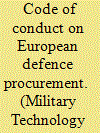

|
|
|
| 6 |
ID:
117652
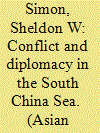

|
|
|
|
|
| Publication |
2012.
|
| Summary/Abstract |
Disputes over sovereignty and freedom of navigation in the South China Sea (SCS) involve both the claimants and major maritime powers. Two starkly different approaches to the SCS conflict are discussed: (1) diplomacy among the claimants either bilaterally or multilaterally; (2) if diplomacy fails, the claimants are building their militaries to assert their rights through force.
|
|
|
|
|
|
|
|
|
|
|
|
|
|
|
|
| 7 |
ID:
118322
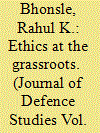

|
|
|
|
|
| Publication |
2013.
|
| Summary/Abstract |
This article addresses the declining standards of morality in the armed forces and suggests measures to address it by undertaking appropriate interventions at the grassroots, unit or battalion. It traces the importance of ethics in the military, particularly in the context of the post-modern state, which grants exclusive authority to the armed forces for the use of violence. Further, it examines the state of ethics today and the challenges in codification to arrive at the basic ethical norms that need to be fostered in the military. Having established this, the article goes on to highlight the context of ethics at the unit level, outlining the challenges faced, including in counter-insurgency operations, normal administrative functioning, and the current approach to ethics training. The author proposes three options as suggestions for building an ethical culture in the unit-the Kohlberg model, the Values and Virtues Approach, and a Code of Conduct.
|
|
|
|
|
|
|
|
|
|
|
|
|
|
|
|
| 8 |
ID:
132565
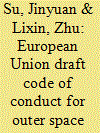

|
|
|
|
|
| Publication |
2014.
|
| Summary/Abstract |
The European Union draft Code of Conduct for outer space activities is one of the primary international initiatives, that are currently active, to enhance the safety, security and sustainability of outer space activities. Although the spirit underlying the instrument is commonly shared by space-faring countries, substantial disagreement exists among States as to some of its core provisions. This article proposes that the Code of Conduct should make a clear distinction between commercial activities and military activities, and adopt more balanced measures on the restriction of military activities in outer space.
|
|
|
|
|
|
|
|
|
|
|
|
|
|
|
|
| 9 |
ID:
074372


|
|
|
|
|
| Publication |
2006.
|
| Summary/Abstract |
This article explores the impact of the EU Code of Conduct on Arms Exports on national legal frameworks, using the case studies of Belgium, Germany and Italy. It considers the differential impact of Europeanisation on high- and low-regulating countries and how non-legally binding decisions agreed in the framework of the CFSP nevertheless exert pressure on member states. It argues that the Europeanisation impact of the Code has not been insignificant, but that it has not had a uniformly strengthening impact. Rather, the Europeanisation of the Code of Conduct has promoted convergence, weakening strong national frameworks and strengthening weak ones.
|
|
|
|
|
|
|
|
|
|
|
|
|
|
|
|
| 10 |
ID:
085736


|
|
|
|
|
| Publication |
Sweden, SIPRI, 2008.
|
| Description |
57p.
|
| Series |
SIPRI policy paper; no. 21
|
|
|
|
|
|
|
|
|
|
|
|
Copies: C:1/I:0,R:0,Q:0
Circulation
| Accession# | Call# | Current Location | Status | Policy | Location |
| 054091 | 382.9142/BRO 054091 | Main | On Shelf | General | |
|
|
|
|
| 11 |
ID:
178156
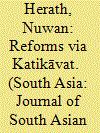

|
|
|
|
|
| Summary/Abstract |
The Theravadi Bhikku Kathikawath (Registration) Bill, presented to the parliament of Sri Lanka in January 2016, is a proposed framework for formulating codes of conduct for Buddhist monks. The bill marked an important moment in the politics of Buddhism, as it led to the emergence of competing views among lay and monastic groups over the question of who could introduce monastic reforms. The paper demonstrates that this effort at monastic reform encountered complexities when attempts were made to incorporate monastic jurisdiction into the state’s legal framework, which in turn led to the failure of the bill. Furthermore, monks from different monastic backgrounds called for deeper reforms of the religious environment itself and the monastic stratum that facilitated it.
|
|
|
|
|
|
|
|
|
|
|
|
|
|
|
|
| 12 |
ID:
142591
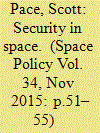

|
|
|
|
|
| Summary/Abstract |
The United States has been engaged in multiple activities to enhance international stability and ensure the sustainability of space activities. This includes multilateral activities within the United Nations such ash the “Group of Government Experts” to study transparency and confidence building measures (TCBMs) for outer space activities. The European Union has been leading talks on a possible international space code of conduct and the United States is supportive of the process. However, European efforts have not been successful in securing support from space powers such as India and Brazil, much less China and Russia. Codes and TCBMs cannot be a substitute for the capabilities necessary to deter potential adversaries and meet U.S. alliance commitments. In fact, the viability of any such codes may rely on the development of deterrence-related capabilities, for example space situational awareness to attribute hostile acts in space. The United States and its allies should take measures to improve the resilience of space systems across the spectrum of conflict. Improving resilience can consist of both “material” and “non-material” solutions. The former include measures such as hardening space and ground systems against physical and cyber attacks. The latter can include development of alternative means of mission performance, such as the use of allied or commercial systems.
|
|
|
|
|
|
|
|
|
|
|
|
|
|
|
|
| 13 |
ID:
142592


|
|
|
|
|
| Summary/Abstract |
Significant initiatives on space traffic management have been recently taken, essentially by developing principles of outer space transparency and confidence building measures (TCBM) beneficial to a safer conduct of space activities. The need for improved practices in space traffic management is a consequence of the increasing number of space-faring nations allowing for more types of missions, growing number of space debris, new private entrants, and rising space content in running critical national infrastructures, to name a few. These expanding space activities underscore the society's dependency on space systems and its vulnerability, calling for an improved long-term sustainability of outer space activities. But the lack of information on the nature of some space payloads and their associated missions introduce a persistent flaw in succeeding to achieve a long thought stable and safer space environment. Indeed this noticeable weakness in the mentioned initiatives is not taken into account at this stage. To overcome this difficulty, a space situational awareness system (SSAS) based on a multinational organization, or under the purview of a UN steered agency, is proposed. It could be implemented promptly, provided there is a shared political will and a recognized urgent need to do so by major space-faring nations gauging their long-term interest while there is still time. The space deterrence postures by dominant space powers that have been identified during the past ten years, or so, argues in favour of broadening as soon as possible the scope of the current TCBM.
|
|
|
|
|
|
|
|
|
|
|
|
|
|
|
|
| 14 |
ID:
131977
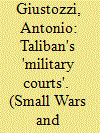

|
|
|
|
|
| Publication |
2014.
|
| Summary/Abstract |
The Taliban's 'code of conduct', which lists rules of discipline for the fighters, has been widely discussed, but do the Taliban try to implement it? This article discusses the structures that the Taliban have put in place for this purpose and their evolution over the years. It assesses that while the Taliban's 'military justice' system is still work in progress, the fact that it has attracted a significant investment in human resources bears witness to a serious intent of the leadership. However, the Taliban's concern with the behaviour of their fighting force is driven by their own political calculus, not by any sympathy for the international law of conflict.
|
|
|
|
|
|
|
|
|
|
|
|
|
|
|
|
| 15 |
ID:
101943
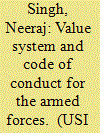

|
|
|
|
|
|
|
|